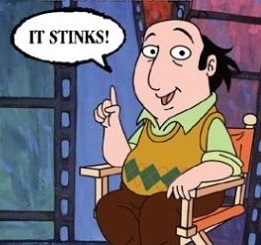
Film criticism is nothing more than one person’s opinion. There, I stated the obvious. In stating that, many will question what the purpose of having film critics is. Surely the common person can come to their own conclusion on the quality of a film without the aid of a critic. That would be correct. So, what’s the point? Film critics are obsolete if their opinion has no sway, correct? Not at all.
The purpose of film criticism is to spark a discussion. Many will disagree with me and that’s their right to. However, their disagreement won’t change my perception on the purpose of film criticism, just as a negative review won’t change my opinion on a film I enjoy. What that negative review will do is offer me the opportunity to see another perspective. In understanding why someone else disliked a film, my enjoyment of it is bolstered. I can grasp how they didn’t perceive the film to be enjoyable, while building up my impression of quality.

Let’s use the inspiration for this article as an example. “Suicide Squad” has divided critics and audiences, with the former finding it to be an incoherent mess and the latter taking to it as fun escapism. Those in defense of the critics point to their breakdown of the filming techniques. More specifically, how the erratic editing bogged the film down, softening the impact of the characters and actions. On the flip side, fans feel they’re looking too deep, missing the point entirely. The chaotic editing for them complements the tone of the film and characters, never tarnishing the spirit and energy of the movie. They had fun and that’s all that matters. Critics just need to learn to have fun.
The problem with that approach is in neglecting another person’s definition of fun. Just because someone didn’t enjoy “Suicide Squad” doesn’t mean they’re stuffy and only want “high art.” In reading many negative reviews of the film (most notably James Berardinelli & Eric D. Snider), I’ve found that the criticism isn’t that the film is mindless entertainment, but in that it’s not entertaining. These people were on board with the notion of escapism via an action blockbuster, but were never able to escape due to their perceived shortcomings of the film. They didn’t feel the characters had enough time to be developed and engaging, the action was cut short by editing and/or too rudimentary to captivate, and the humor didn’t generate many laughs. They’re not missing the point by feeling this way, only voicing that the point didn’t work for them. If they were to miss the point, they wouldn’t have given “Deadpool” a positive review (nor would it have an eighty-four percent fresh rating on Rotten Tomatoes). If one is of the opposite opinion, they are just as correct as those opposing them. There is no right or wrong in opinion, just emotion. This is a conviction, not a competition.

But what of those critics who do decry films for trying to have fun? That find the likes of “Suicide Squad” to be abhorrent because they aren’t trying to be high art such as the works of Terence Malick and Stanley Kubrick? How does one respond to those who purposely miss the point of a film and damn those who enjoy what they believe to be lowbrow claptrap? Fuck them! Not literally, though if that’s your prerogative and they’re consensual, then by all means. Fuck them in the figurative sense. Realize their viewpoints clash with yours and arguing with them the merits of “Suicide Squad” is as futile as selling body cream to a corpse.
The funny thing about those stuffy critics is that, in their belief that their opinion trumps all, their criticism actually does have sway; just not in the way they expect. As to not single anyone out, I’ll create a fictitious stuffy critic to use as an example to prove my point. I shall call him Stuffy McStufferton (which also doubles as the world’s worst porn name). Stuffy reviews “Suicide Squad” with preemptive disdain. He knows he’ll hate it, as he finds the quality of the subject matter to be cheap. He finds anyone that disagrees with him to be ignorant fools that need to be saved from mediocrity. He truly believes his review will convince the masses to avoid the film. He has no time for discussion on the matter. Technically he’s wrong, seeing as how “Suicide Squad” broke August box office records and debuted to $135 million. If he’s wrong, then how does his criticism have sway? Simple.

Months go by and “Wonder Woman,” the latest chapter in the DC Cinematic Universe, is released. Stuffy McStufferton approaches the film the exact same way he did “Suicide Squad,” with preemptive disdain and malice. His opinion practically mirrors that of the last film in the franchise, right down to the God complex. Joe Schmo reads his review, having disagreed with him on “Suicide Squad.” He has his reservations about “Wonder Woman” and, for reasons unbeknownst to him, decides to read Stuffy’s review before seeing the film for himself. He notices the similarities to the previous review, causing him to make a decision. He’s going to go see “Wonder Woman” because Stuffy hated it! He comprehends that the two have differing viewpoints and that Stuffy hating something means he’ll love it. The review confirmed his beliefs that he’d enjoy the film, even though he was meant to be swayed otherwise. He was swayed from indifference to giddiness. Stuffy McStufferton still proved a purpose, even if it wasn’t via his intention. He made someone think and eventually discuss a film.
Throughout all of my rambling, I neglected to mention my review of “Suicide Squad.” This was purposeful, as it was meant to show my understanding of both sides of the critical spectrum. I could understand why the detractors disliked the film, while grasping the mentality of the admirers and their enjoyment of it. I technically land on the side of the detractors, as my C+ rating and breakdown of the film’s weaknesses label my review a negative one. Not that this matters. My review wasn’t meant to prevent the public from seeing the film, but to spark a discussion for those who will or had seen it. I’ll be the first to admit my reviews can sometimes come across on the contrary, but that’s only because my passion seeps through.

That’s why film critics do what they do: out of passion. Even Stuffy McStufferton, intellectual savior of the masses (with respect to Damien Sandow), is driven my passion. It may be wrongheaded to some, but it doesn’t discredit his passion. Nobody’s opinion can be discredited, only discussed. Even dissecting the more objective aspects of filmmaking, such as in framing a shot or reproduction of sound, cannot substitute the subjectivity of opinion. If one wants to be correct, then engage in more grounded arguments such as science, which is supported by fact. When it comes to film, or art of any kind, subjectivity is king.
The takeaway from this article is to embrace opposing views, not diminish them. Many claim critics are snobs that look down one’s nose at the mere prospect of fun, generalizing those who engage with it as insipid. The response is to chastise those who don’t have fun, meant solely for the critics, but demeaning to those in the general public that also didn’t find the film to be fun. It’s succumbing to the perceived notion of condescension as opposed to overcoming it.
You don’t need the approval of another to enjoy art. All you need is to understand.
